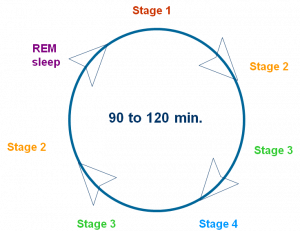Fatigue Risk Management for Employees
What is Fatigue?
- A state of physical or mental weariness
that results in reduced alertness - The result of a lack of adequate sleep
- A sleep debt that accumulates until
paid off with adequate sleep
Discussion
What are some conditions
that make you feel particularly tired or fatigued at work?
Causes of Fatigue
Fatigue can be the result of a variety of factors:
- the body’s natural rhythms
- work schedule
- type of task
- work environment
- non work-related issues
The Body Clock
- Known as circadian rhythms
- Operates on a 24-hour cycle
- Makes you sleepy when it’s dark and awake when it’s light
- Controls a variety of body functions:
- Sleepiness
- Digestion
- Hormone production
- Body temperature
Circadian Rhythms
- Core body temperature across a 24-hour period
- Alertness follows a similar curve – as body temperature rises, you become more alert
Sleep
- Most people need between 7 and
9 hours per day. - It’s not true that you need less sleep
as you get older. - When you sleep makes a difference
in how much you get. - Sleep is best obtained in a single block.
Sleep Cycles
When you sleep, you cycle through five different sleep stages.
A Serious Safety Hazard
When you’re fatigued:
- your reaction time is slower
- you have trouble concentrating or remembering things
- you may have difficulty communicating clearly with co-workers
- you may fall asleep on the job
- there’s a greater risk you’ll make a safety-critical mistake
Being fatigued can make you a risk to yourself, your co-workers, and the public!
As Dangerous as Alcohol?
After 24 hours awake, you will be as impaired as if you were legally too drunk to drive.
Consequences for Health
- Fatigue has an impact outside work.
- Studies have found that shiftworkers are more likely to suffer from:
- irritability, stress, anxiety, and depression
- gastrointestinal problems
- cardiovascular illnesses
- reproductive problems
Family and Social Life
- Working shifts can make you feel socially isolated – you work while others have fun.
- It can take heavy a toll on family:
- less involved in daily life
- harder to organize domestic chores
- difficulty arranging childcare
- higher risk of divorce
- You may be tempted to choose social or family activities over sleep.
Commuting
- One of the most dangerous things you can do while fatigued is drive.
- You may be driving during the very times that your body most wants to sleep.
- Nightshift workers are 4 to 7 times as likely to have an accident driving home.


